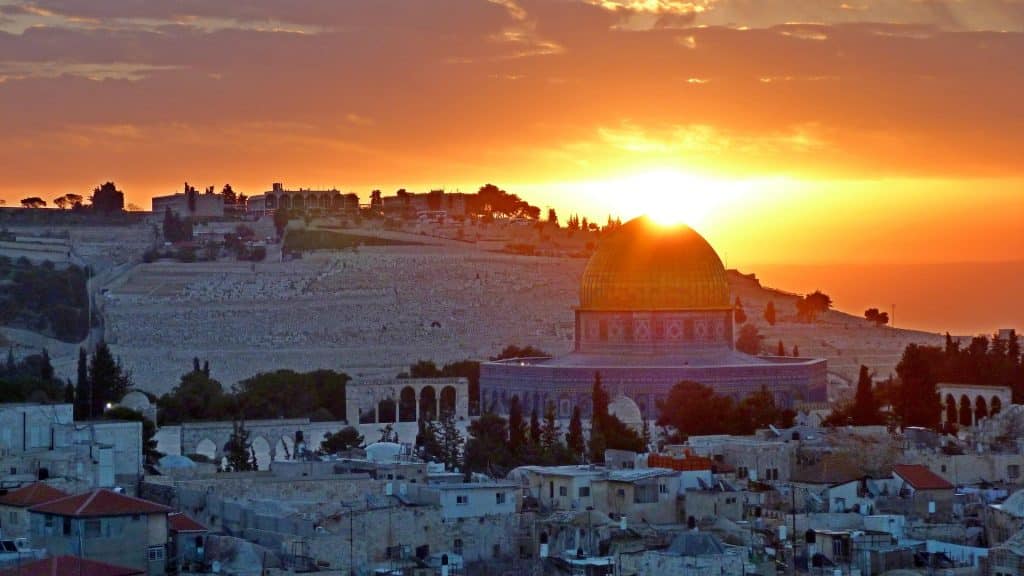September 10, 2018
Issue No. 33, September 2018
A Monthly Newsletter for Paulist Associates
The Associates World is the newsletter of the Paulist Associates. You can download a copy of this newsletter in PDF format (excellent for printing), or scroll down to read it in your Web browser.
- A Paulist Pilgrimage to the Holy Land
- BROKEN – A Review of the BBC Series
- Faith Sharing: No Substitute for Personal Encounters
- Upcoming Paulist Pilgrimages
- Paulist Press (a short history)
- Proposed Program for September
- Consider submitting an article for inclusion in an upcoming issue of The Associates World
- Calendar of Events
- Prayer for the Intercession of Father Isaac T. Hecker
- Contacts
- Promise
by Brian P. Flanagan, PhD, a Paulist Associate, Boston
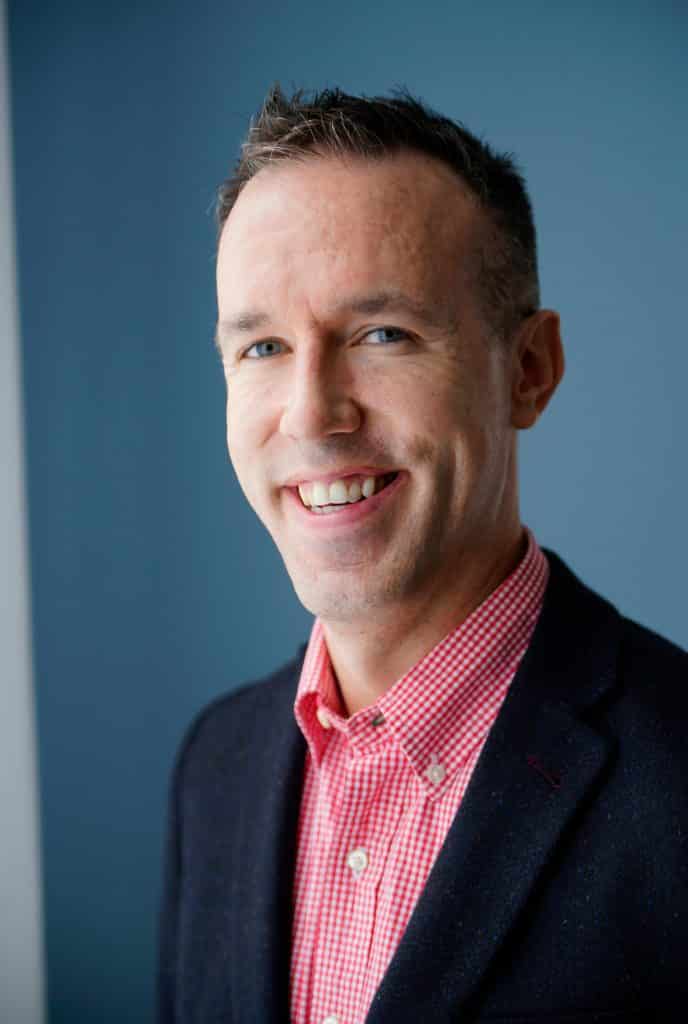
And that, not surprisingly, is the story of where my new book, Stumbling in Holiness: Ecclesial Sin and Sanctity, began.
My driving question is how one could understand and honestly pray the church’s creed, to say “I believe in the holy church,” in the face of such evident individual and collective evil, and in the face of so much other wrongdoing in the history of our church. I had expected this fall, in speaking about the book, I would have to work hard to bring my audiences back to the vividness of that time and the painful memory of the church that failed us. Sadly, I’m no longer worried about that.
It took me a decade and more to begin to get a response to that question: the work of finishing my PhD, getting a job, learning how to be a not horrible teacher, getting a tenure – all of that, and the difficulty of the question itself, made me take my time. And while my answer to how to believe in a holy and sinful church is as partial and imperfect as any theologian’s attempt to understand the beautiful mystery of God and God’s church and the terrible mysteries of evil and sin, my hope is that the book’s appearance now might be a help to our church, including our Paulist community, as we move forward together.
The book starts in the same place as my questions, on the other side of the red doors at 5 Park Street in Boston – that is, in our regular celebration of the liturgy at Paulist Center. In the first chapter, I explore how before we theologians invoke our weighty concepts and attempt to outline the history of thought on the question, the Mass already gives us the primary answer of who we are as a holy and a sinful church. Every week when we gather as church, both in our words but also in the way we pray with our bodies and posture, we do at least three steps in an intricate choreography.
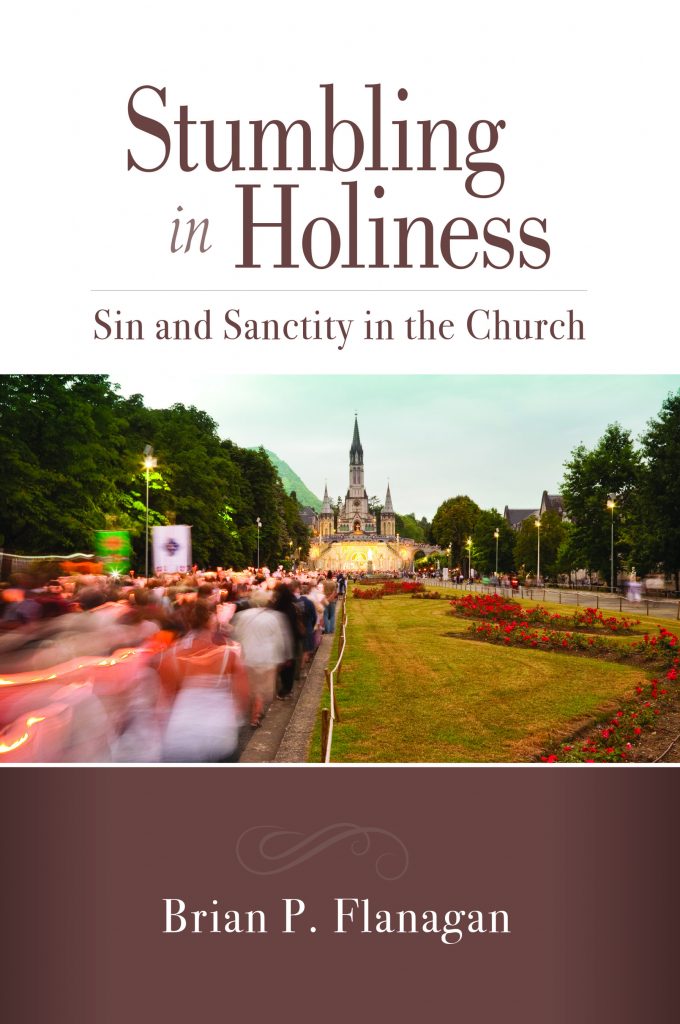
And yet there’s a third step – God’s embrace of us in our failing, God’s love for us as sinners on a pilgrimage rather than saints arrived at the destination, God’s willingness to always enter under the leaky roofs and messy houses of our lives.
Everything else in the book, I hope, flows from that and is an attempt to understand that deep structure of Christian prayer better. I write a bit more about the history of how we think about holiness, sin, and church, and about various theological strategies to put those three concepts together. I’m particularly critical of one of the earlier ways Catholics have tried to avoid dealing with the paradox of our experience of a holy and sinful church by pretending that there’s something called “the church” different from us, its members.
Such a “hypostatization” (fancy theological term alert) or personification of the church might be helpful for finding a way to express our love for the community of the church, but when that language hardens into the formula that “the church does not sin, but its members do,” I think we make it harder to talk about the real failure and sin of the church, past, present, and, sadly, future. Learning how to talk about the sinful church honestly and openly in our theology is a necessary step for the church’s continuing conversion and renewal.
And so, with all that, I’m hoping that my book might give us some hope in these times. It might help us to appreciate more clearly the “next-door saints” and saintliness that Pope Francis pointed us to in Gaudete et Exsultate – the holy “ordinary people in ordinary time,” as theologian Elizabeth Johnson calls them, whose openness to the Spirit and living out of their baptism is the deepest story of the holiness of the church.
It’s that individual indwelling of the Holy Spirit that Isaac Hecker taught us which will allow us as Paulist Associates to model forms of ecclesial holiness in ordinary time that may help us give hope to our church and to our world in these times.
Brian P. Flanagan is Associate Professor of Theology at Marymount University in Arlington, Virginia and has been a Paulist Associate since 2004. He contributes to www.dailytheology.org and is on Twitter at @BrianPFlanagan
Stumbling in Holiness: Ecclesial Sin and Sanctity will be available later this month.
By Fr. James DiLuzio, CSP
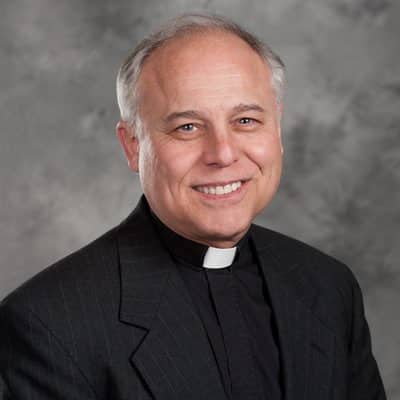
Only last week did I become aware of and watch the full season of BBC’s one-season TV series entitled BROKEN. (Available for download on Amazon Prime)
As a Catholic priest in the United States I truly appreciate the series’ honest depiction of a priest, his daily life and ministry, the torment of sexual abuse within it the willingness of the series’ characters to persevere in the reality of Christ – the heart of our faith – while attending to the failures of the Church as Institution.
I was deeply moved by every episode and amazed at how the writer/producer Jimmy McGowen understands Catholic Christianity – what it is, all that it can be and must be. I also found comforting BROKEN’s assertion that we are all broken in various ways and that one essential choice for health is to claim ourselves as wounded healers comforting others.

I am promoting BROKEN today because of the show’s integrity as drama and as a healthy critique of our Catholic institution badly in need of healing. In light of the publication of the Pennsylvania Church abuse cases, it is obvious to so many of us that our Church needs much more transparency and much more dialogue and collaborative leadership with the laity to address its dysfunctions.
Clearly, this institution of ours must work together with behavioral scientists and learn more from their collective wisdom about human sexuality in order to reform our moral teachings and praxis, to bring about healing and make further amends.
I hope you will view BROKEN and I welcome your responses to it.
Paulist Fr. James DiLuzio was ordained in 1993. He leads dynamic parish missions and retreats around the United States and Canada. He is the creator of “Luke Live,” a dramatic proclamation of the Gospel of Luke that includes meditations, discussions, preaching and song (sacred and secular).
by Rev Thomas Ryan, CSP,
A longer version of this article first appeared in Koinonia, a quarterly newsletter of the Paulist Ecumenical and Interfaith Relations Office
I spent one Labor Day weekend at the Rosemont Convention Center in Chicago with over 30,000 Muslims who were participating in the annual conference of the Islamic Society of North America (ISNA). ISNA is the only Islamic organization in the world that has succeeded in bringing together the diverse groups of Muslims: Arab-South Asian; Black-White; Shi’a-Sunni. The event, established in 1963, combines learning—120 workshops on a wide-variety of mostly non-political subjects—with celebration in the form of art, film festival, and literary entertainment.
The weekend afforded me the opportunity to listen to Muslims talk with one another about things that are on their minds, and to converse with them over meals, as well as before and after the sessions. Of irreplaceable value in this is that the personal encounter humanizes the “other” who has to some extent—whether we admit it or not–been stereotyped in our minds by media impressions. Add to this the insight and perspectives that come just by listening and asking questions. Some examples:
If I had heard just one speaker say, “Our mission in life is not to convert people to Islam or to save humanity, but to influence humanity to open to Allah who can save it,” I might have said, “yeah, right….” and stayed with the stereotype of a hidden Muslim agenda to convert America. But I heard three different speakers say the same thing in different and unrelated sessions.
The former, reformist President of Iran, Mohammad Khatami, made his own contribution to that theme in addressing a plenary session: “There is a great opportunity of dialogue and cooperation among people of faith,” Khatami said. “But I mean people of true faith. I don’t mean extremists and terrorists. Public opinion can be rescued from the grips of ignorance and blunder, and the domination of arrogant, war-mongering and violence-triggering policies will end.” He told the packed plenary that Muslims must forge a new identity that embraces the modern world, tolerates other religions and works toward peace.
In a session on Answering Difficult But Frequently Asked Questions About Islam, I got another angle on why Muslims take a pass on Jesus’ death and resurrection. What I have previously been given to understand is that for God to be hungry, thirsty, tired, tortured is unthinkable. So as the Qur’an says, “It so appeared to them” (emphasis mine) that he died. But the answer that the speaker, Jamal Badawi, gave was that the issue is not whether a prophet could die such a death—several have, he said—but that there is no concept of inherited sin in Islam, and therefore no need for atonement. “Whether Jesus died or not doesn’t make any difference to our faith. Crucifixion just isn’t theologically important for Muslims as it is for Christians.”
How did they respond to a priest being in this sea of Muslims? One high school student stepped up to me and said, “Hey, what’s with the neck thing (collar)?” It occasioned a friendly conversation, and at a session the next day when I was looking for a free seat in the plenary hall, he spotted me and waved me over to one next to him. Mostly I just got a lot of appreciative nods of the head accompanied by a smile.
The conference theme—Achieving Balance in Faith, Family, and Community—effectively summarized the preoccupation of believers of every stripe in North America today. In the end, what left the deepest impression was simply this: here is a community of people with a strong faith in the God of Abraham and a strong track record in community service and charity (the city of Chicago’s foodbank said that the Muslim contribution last year was larger than any it had ever received in its history). In an era of secularization where faith is increasingly being air-brushed from the public square, I felt grateful for the witness of these believers and a desire to strengthen our relationship as “people of the Book”.
Fr. Tom Ryan, CSP is director of the Paulist North American Office for Ecumenical and Interfaith Relations, located in Boston, MA.
Paulist Fathers Thomas A. Kane and Bruce Nieli will lead an unforgettable 12-day pilgrimage to Israel and the Holy Land. Registration and pricing available now.
Join Fathers Thomas A. Kane and Rich Andre for a 12-day pilgrimage to Greece and the Islands. Who better to explore Pauline sites than two members of the Paulist Fathers? St. Paul, our patron saint, is a key inspiration in our lives and ministry! Fr. Thomas has traveled extensively throughout the world, leading many pilgrimages in Greece and Turkey. His knowledge of art and culture will enhance the spiritual depth of our time together with special prayer services and liturgies. Fr. Rich has journeyed to the Holy Land, bringing scriptural insights and a liturgical enthusiasm to the group. Registration and pricing available now.
An excerpt for the Paulist Press website
The Paulist Press is a major component of the work of the Paulist Fathers and follows the principles of it’s founder. The Reverend Mark-David Janus, CSP, Ph.D. is the President and Publisher of the Paulist Press and he writes about the history of this ministry on the Paulist Press website:
Fr. Hecker wanted to make contact with those who would never set foot in a church. So he turned to the printed word. The first product of his vision was a monthly publication, the Catholic World magazine. He wanted to create an intellectual journal for a growing Catholic population, and insisted that it be a first-class publication in format, quality, and style, equal if not superior to any secular magazine in the country. The Catholic World, later reconstituted as the New Catholic World, was to continue in existence for well over a century. Editors like Frs. Augustine Hewit, John J. Burke, James M. Gillis, and John B. Sheerin advanced the Paulist tradition of presenting a Catholic perspective on the important questions of the day. Although the circulation of the Catholic World quickly reached 10,000, Hecker foresaw the need to reach a wider audience who could not afford the price of a magazine. In 1866 he founded The Catholic Publication Society to produce four-page pamphlets that provided a succinct presentation of Catholic teaching. These could be sold across the nation for a penny apiece. Hecker also began a highly successful illustrated monthly for children. Its first issue appeared in October of 1870 as The Young Catholic, and within a year it was in the hands of 50,000 youthful readers.
In the 1960’s Paulist Press made a creative and significant contribution to American education with the development of Catholic Library Services (CLS). This new division of the Press provided schools throughout the United States with an immediately usable, comprehensive, and up-to-date library. CLS grew into the American Library and Educational Services Company (ALESCO). ALESCO’s success led to its incorporation as an independent company, separate from the Paulist Press, in 1969.
The Second Vatican Council in the 1960s inspired a great interest in and excitement about issues of theology and religious education. This meant a new opportunity for Paulist Press to fulfill its mission to interpret the church to the modern world and the modern world to the Church. In cooperation with various European publishers, the Press brought out a 50-volume series of hardbound books with the collective title Concilium: Theology in the Age of Renewal. This series made available to readers of all faiths the theological basis for the developments in the church during and after the Council. Come to the Father, published and distributed in 1967, was the first elementary school religious education program to provide Catholic children in the United States with the newest advances in catechetics.
As Paulist Press grew it also moved, from its original location at the parish of St. Paul the Apostle in midtown Manhattan to Varick St. (near Greenwich Village) in 1958, to Glen Rock, New Jersey. in 1962, to Paramus in 1966, and Ramsey in 1976. Since 1985 the editorial, business, marketing and distribution offices of the Paulist Press have been located in Mahwah, NJ. Today Paulist Press is a leading publisher of hardcover and paperback books, audio and video tapes, educational programs and materials for parish renewal. Its Classics of Western Spirituality, now in its twentieth year, provides over 90 volumes of the original writings of universally acknowledged teachers within the Catholic, Protestant, Eastern Orthodox, Jewish, Islamic, and American Indian traditions. Its Stimulus books explore issues in the contemporary dialogue between Christians and Jews. The “What Are They Saying About (WATSA)?” series provides concise overviews of contemporary religious, moral, theological, and scriptural questions. Through children’s books, works on spirituality and prayer, and studies of the latest developments in theology and scripture, the Press continues its mission to bring the riches of the Catholic heritage to Catholics and persons of other religious traditions.
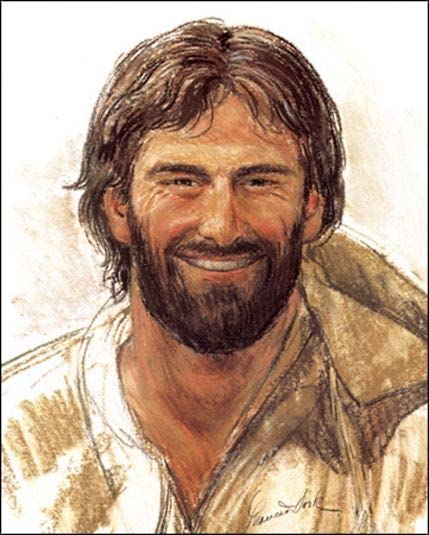
Thanks to Columbus Paulist Associates Jane Kelsey, Jeanne Sherer, Sandy Murray, Ana Berrios-Allison, Katherine Murphy
Theme: Discovering the JOY of the Gospel
Pope Francis’ Apostolic Exhortation, The Joy of the Gospel, challenges us to delve deeper into the concept of joy. Have you ever pondered what it really means to live into the joy of the gospel? Are the gospels truly “Good News” for us? How can we discover this holy joy that Pope Francis writes about? How can our lives be changed because of it?
Opening Prayer
As we gather together, let us pray:
Dear God, help us to remember that being Christian doesn’t mean being serious all the time. Help us to find the joy in everyday living – the sound of a child’s laughter; the smile of a stranger; the colors of the rainbow against the dark storm clouds; the purples, oranges, pinks and blues of a magnificent sunset; the color and fragrance of a flower; the aroma of food shared with family and friends; the sights and smells of a walk on the beach or at the park; a song on the radio; a nap, a rocking chair and a good book; blue skies, green trees and fresh air; the magnificence of a good thunderstorm; a quiet place to rest.
Make us aware of all your gifts that don’t need ribbons. Help us remember the joy of loving and being loved. Let us be open to Your message – “Gather to celebrate because we are community. Sign up for the party. Celebrate the moment. Treasure the memory. Share the joy. Enjoy the little things because one day you will look back and realize they were the big things on your journey. Find the extraordinary in the ordinary.” In the words of St. Paul – “May the God of hope fill you with all joy and peace.” Lastly, Lord, when we are given the chance, give us the courage to step out of our comfort zone and dance.
Amen
Reading (in advance of the meeting)
An excerpt from The Joy of the Gospel, Apostolic Exhortation Evangelii Gaudium of the Holy Father Francis to the Bishops, Clergy, Consecrated Persons and the Lay Faithful on the Proclamation of the Gospel in Today’s World
- THE JOY OF THE GOSPEL fills the hearts and lives of all those who encounter Jesus. Those who accept his offer of salvation are set free from sin, sorrow, inner emptiness and loneliness. With Christ, joy is constantly born anew. In this exhortation I wish to encourage the Christian faithful to embark upon a new chapter of evangelization marked by joy, while pointing out new paths for the Church’s journey in years to come.
- A JOY EVER NEW, A JOY WHICH IS SHARED.
- The great danger in today’s world, pervaded as it is by consumerism, is the desolation and anguish born of a complacent yet covetous heart, the feverish pursuit of frivolous pleasure, and a blunted conscience. Whenever our interior life becomes caught up in its own interests and concerns, there is no longer room for others, no place for the poor. God’s voice is no longer heard, the quiet joy of his love is no longer felt, and the desire to do good fades. This is a very real danger for believers too. Many fall prey to it, and end up resentful, angry, and listless. That is no way to live a dignified and fulfilled life; it is not God’s will for us, nor is it the life in the Spirit which has its source in the heart of the risen Christ.
- I invite all Christians, everywhere, at this very moment, to a renewed personal encounter with Jesus Christ, or at least an openness to letting him encounter them; I ask all of you to do this unfailingly each day. …
- A JOY EVER NEW, A JOY WHICH IS SHARED.
- The Gospel, radiant with the glory of Christ’s cross, constantly invites us to rejoice. A few examples will suffice.
“Rejoice!” is the angel’s greeting to Mary (Lk 1:28).
Mary’s visit to Elizabeth makes John leap for joy in his mother’s womb (cf. Lk 1:41).
In her song of praise, Mary proclaims: “My spirit rejoices in God my Savior” (Lk 1:47).
When Jesus begins his ministry, John cries out: “For this reason, my joys been fulfilled” (Jn 3:29).
Jesus himself “rejoiced in the Holy Spirit” (Lk 10:21)
His message brings us joy: “I have said these things to you, so that my joy may be in you, and your joy may be complete” (Jn 15:11).
Our Christian joy drinks of his brimming heart. He promises his disciples: “You will be sorrowful, but your sorrow will turn into joy” (Jn16:20).
Then he goes on to say: “But I will see you again and your hearts will rejoice, and no one will take your joy from you” ( Jn16:22.)
The disciples “rejoiced” (Jn 20:20) at the sight of the risen Christ.
In the Acts of the Apostles we read that the first Christians “ate their food with glad and generous hearts” (2:46).
Wherever the disciples went, “there was great joy” (8:8); even amid persecution they continued to be “filled with joy” (13:52).
The newly baptized eunuch ”went on his way rejoicing” (8:39), while Paul’s jailer “and his entire household rejoiced that he had become a believer in God” (16:34).
- Why should we not also enter into this great stream of joy? There are Christians whose lives seem like Lent without Easter. I realize of course that joy is not expressed the same way at all times in life, especially at moments of great difficulty. Joy adapts and changes, but it always endures, even as a flicker of light born of our personal certainty that, when everything is said and done, we are infinitely loved. I understand the grief of people who have to endure great suffering, yet slowly but surely we all have to let the joy of faith slowly revive as a quiet yet firm trust, even amid the greatest distress: “My soul is bereft of peace: I have forgotten what happiness is…But this I call to mind, and therefore I have hope: the steadfast love of the Lord never ceases, his mercies never come to an end; they are new every morning. Great is your faithfulness…It is good that one should wait quietly for the salvation of the Lord” (Lam 3:17, 21-23, 26).
- …instances of joy flow from the infinite love of God, who revealed himself to us in Jesus Christ. I never get tired of reading the words of Benedict XVI which takes us to the very heart of the Gospel: “Being a Christian is not the result of an ethical choice or a lofty idea, but the encounter with an event, a person, which gives life a new horizon and a decisive direction”
- Thanks solely to this encounter – or renewed encounter with God’s love, which blossoms into an enriching friendship, we are liberated from out narrowness and self-absorption. We become fully human when we become more than human, when we let God bring us beyond ourselves in order to attain the fullest truth of our being. Here we find the source and inspiration of all our efforts at evangelization. For if we have received the love.
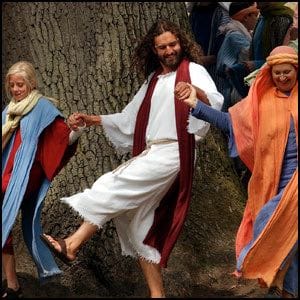
- What Good News do you find in the Gospels?
- Where in your life do you find joy? How does the way you live your life reflect that joy?
- What makes your soul dance with joy?
- How are you invited to find joy in difficult situations, troubled relationships, work difficulties, painful losses, etc.
News/Announcements
Closing Prayer
Heavenly Father, you called your servant Isaac Thomas Hecker to preach the Gospel to the people of North America and through his teaching, to know the peace and the power of your indwelling Spirit. He walked in the footsteps of Saint Paul the Apostle, and like Paul spoke your Word with a zeal for souls and a burning love for all who came to him in need.
Look upon us this day, with compassion and hope. Hear our prayer. We ask that through the intercession of Father Hecker your servant, you might grant us (state the request).
We ask this in the name of Jesus Christ, Your Son, Our Lord, who lives and reigns with You and the Holy Spirit. One God, forever and ever. Amen.
- September 1: Diaconate Ordination of Evan Cummings, Basilica of the Shrine of the Immaculate Conception, Washington DC
- Sep 1 – Sep 22 (Every Saturday) Coffie on the Common – Boston Common, a 4-week series on how the four cardinal virtues might show up in our every day lives
- September 2: Dedication & Blessing of the renovation of St. Austin’s Church, Austin, TX
- October 16-18: Pastors/Superiors/Directors Meeting, Washington Retreat House, Washington DC
The Associates World welcomes submissions of articles or information about upcoming events. These should be sent as Microsoft Word documents and attached to an email to [email protected]. Except for reporting on late-month events, we would appreciate receiving submissions by the 20th of the month before the publication date. Please contact editors Kathleen Lossau ([email protected]) or Denis Hurley ([email protected]) with questions or article proposals.
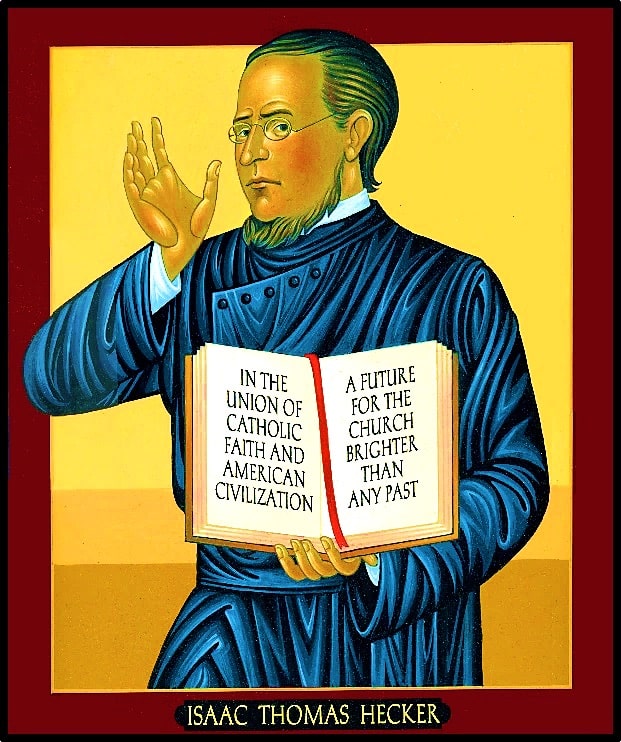
Look upon us this day, with compassion and hope. Hear our prayer. We ask that through the intercession of Father Hecker your servant, you might grant us (state the request).
We ask this in the name of Jesus Christ, Your Son, Our Lord, who lives and reigns with You and the Holy Spirit. One God, forever and ever. Amen.
When you pray this prayer, and if you believe that you have received any favors through Hecker’s intercession, please contact the Office of the Cause for Canonization of Servant of God, Isaac Hecker at [email protected]. Visit the web site: isaachecker.org to learn more about his life and the cause for his canonization.
Paulist Associates National Director
Frank Desiderio, C.S.P.
Paulist General Office
New York, NY 10023
Board Members
Cathy Hoekstra
Grand Rapids, MI
Mike Kallock, CSP
Katherine Murphy Mertzlufft
Columbus, OH
Joe Scott, CSP
David Rooney
Chicago, IL
Mary Sullivan
Boston, MA
I believe that I am drawn by the Holy Spirit to the spirituality and qualities of the Paulist Community. I have discerned both by prayer and study that God calls me to become associated with the Paulists. I promise that I will pray for the works of the Paulist Society, meet with others, who are also members of the Paulist Associates, for spiritual sharing and formation; and I seek to embody the apostolic qualities of the Paulists in my daily life.
Attentive to the Holy Spirit and faithful to the example of St. Paul and the charism of Father Isaac Hecker, I commit myself for one year of membership in the Paulist Associates.
